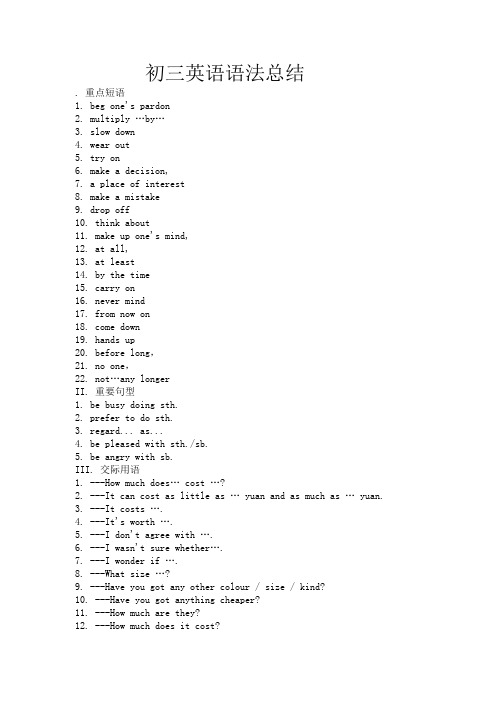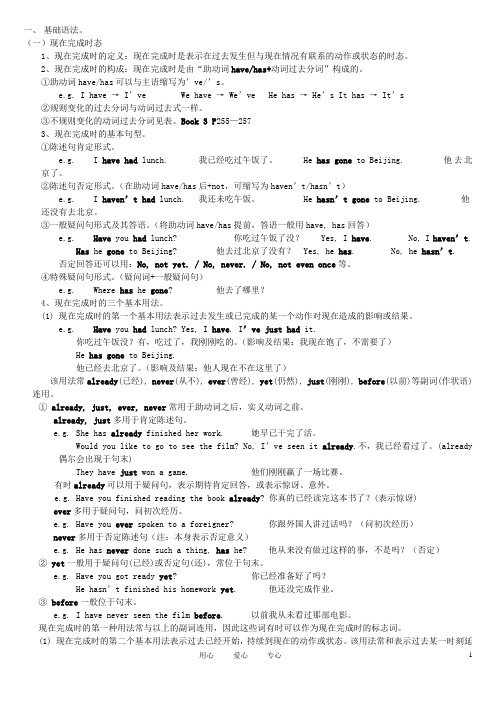新目标九年级英语语法汇总强力推荐 新课标
强力推荐 新课标新目标九年级英语单元知识点、短语及句型总结

Unit 1一、知识点1.Check in : 在旅馆的登记入住。
Check out: 在旅馆结账离开。
2.By: ①通过…..方式(途径)。
例:I learn English by listening to tapes.②在…..旁边。
例:by the window/the door③乘坐交通工具例:by bus/car④在……之前,到……为止。
例:by October在10月前⑤被例:English is spoken by many people.3.how与what的区别:how通常对方式或程度提问,意思有:怎么样如何,通常用来做状语、表语。
what通常对动作的发出者或接受者提问,意思为什么,通常做宾语,主语。
①How is your summer holiday? It’s OK.(how表示程度做表语)②How did you travel around the world? I travel by air.③What do you learn at school? I learn English, math and many other subjects.①What…think of…? How…like…?②What…do with…? How…deal with…?③What…like about…? How…like…?④What’s the weather like today? How’s the weather today?⑤What to do? How to do it?e.g. What do you think of this book?=How do you like this book?I don’what I should do with the matter.=I don’should deal with it.What do you like about China?=How do you like China?I do n’t know what to do next step?=I don’t know how to do it next step?㊣What good / bad weather it is today!(weather为不可数名词,其前不能加a )㊣What a fine / bad day it is today! (day为可数名词,其前要加 a )4. aloud, loud与loudly的用法: 三个词都与"大声"或"响亮"有关。
202X年英语知识点汇总人教新目标九年级

千里之行,始于足下。
202X年英语知识点汇总人教新目标九年级2020年英语知识点汇总(人教新目标九年级)一、语法知识点1. 一般现在时和现在进行时2. 一般过去时和过去进行时3. 现在完成时和过去完成时4. 将来时和过去将来时5. 被动语态6. 定语从句7. 名词性从句8. 直接引语和间接引语9. 虚拟语气10. 并列连词和从属连词的用法11. 条件句的用法12. 状语从句的用法13. 宾语从句的用法14. 主谓一致的考点15. 各种名词的用法、单复数等二、词汇知识点1. 动词动名词的用法2. 形容词的比较级和最高级3. 副词的比较级和最高级4. 形容词和副词的用法第1页/共3页锲而不舍,金石可镂。
5. 复合词的构成和词义6. 介词短语的用法7. 词义辨析8. 词组和固定搭配9. 常用短语和习惯用法10. 习惯用法的辨析11. 词形转换和派生词的用法12. 各种词类的用法13. 词汇的辨析和用法三、阅读理解1. 认字识词2. 词义猜测3. 阅读顺序4. 推理判断5. 阅读理解题型6. 文章主旨大意7. 文章结构8. 文章出处和作者意图9. 文章的背景和情节10. 文章的观点和态度四、写作技巧1. 书信的格式和写作方法2. 日记的写作技巧和模板3. 描写人物和事物的方法和技巧4. 叙事文的基本结构和写作方法5. 说明文的写作结构和方法千里之行,始于足下。
6. 议论文的写作方法和写作要点7. 描写环境的方法和技巧8. 写人的方法和技巧9. 文章的开头结尾的写作方法10. 给与建议和提出要求的写作方法五、口语和听力技巧1. 听力技巧和短文理解2. 表达观点和意见的口语表达3. 描述个人经历和事件的口语表达4. 提问和回答的技巧和表达方式5. 谈论过去和将来的口语表达6. 演讲和口头报告的技巧和写作方法7. 各种口语问答的技巧和表达方式8. 倾听和回答问题的技巧和方法9. 讨论和辩论的技巧和写作方法10. 口语表达的流利程度和准确性第3页/共3页。
强力推荐 新课标初中英语语法大全[原创]新目标
![强力推荐 新课标初中英语语法大全[原创]新目标](https://img.taocdn.com/s3/m/e019c1503b3567ec102d8a5a.png)
初中英语语法大全[原创]新目标语法网络图一、名词名词在句中表示所有关系的语法形式叫做名词所有格。
所有格分两种:一是名词词尾加’s构成,二是由介词of 加名词构成。
前者多表示有生命的东西,后者多表示无生命的东西。
用于无生命的东西:the legs of the chair, the cover of the book用于有生命的东西,尤其是有较长定语时:the classrooms of the first-year students 用于名词化的词:the struggle of the oppressed二、冠词冠词分为不定冠词(a, an),定冠词(the),和零冠词。
1. one, some 与any:1) one 可以泛指任何人,也可特指,复数为ones 。
some 多用于肯定句,any 多用于疑问句和否定句。
One should learn to think of others. Have you any bookmarks? No, I don’t have any bookmarks. I have some questions to ask.2) some 可用于疑问句中,表示盼望得到肯定的答复,或者表示建议,请求等。
Would you like some bananas? Could you give me some money?3) some 和any 修饰可数名词单数时,some 表示某个,any 表示任何一个。
I have read this article in some magazine. Please correct the mistakes, if any. 4) some 和数词连用表示“大约”,any 可与比较级连用表示程度。
There are some 3,000 students in this school. Do you feel any better today? 2. each 和every:each 强调个别,代表的数可以是两个或两个以上,而every 强调整体,所指的数必须是三个或三个以上。
强力推荐 新课标新目标九年级英语语法总结

新目标九年级英语语法总结Unit11. by + doing 通过……方式如:by studying with a groupby 还可以表示:"在…旁","靠近","在…期间"、"用,""经过","乘车"等如:I live by the river. I have to go back by ten o'clock.The thief entered the room by the window. The student went to park by bus.2. talk about 谈论,议论,讨论talk to sb. === talk with sb. 与某人说话3. 提建议的句子:①What/ how about +doing sth.? ②Why don't you + do sth.? ③Why not + do sth. ?④Let's + do sth. ⑤Shall we/ I + do sth.?4. a lot 许多常用于句末如:I eat a lot. 我吃了许多。
5. too…to 太…而不能常用的句型too+adj./adv. + to do sth.6. aloud, loud与loudly的用法三个词都与"大声"或"响亮"有关。
①aloud是副词,重点在出声能让人听见,但声音不一定很大,常用在读书或说话上。
通常放在动词之后。
aloud没有比较级形式。
如: He read the story aloud to his son.他朗读那篇故事给他儿子听。
②loud可作形容词或副词。
用作副词时,常与speak, talk,laugh等动词连用,多用于比较级,须放在动词之后。
如:She told us to speak a little louder. 她让我们说大声一点。
新目标英语九年级各单元重点语法归纳

新目标英语九年级各单元重点语法归纳Unit 1 - Present Continuous Tense- 用于描述正在发生的动作或情况- 构成:be动词(am, is, are) + 现在分词 (-ing形式)Unit 2 - Past Simple Tense- 用于描述过去发生的动作或情况- 构成:动词过去式或动词的第二形式- 用于比较两个或多个人或物的特征或性质- 构成:形容词或副词 + 比较级/最高级Unit 4 - Conditional Sentences- 用于表示条件和结果之间的关系- 构成:条件从句 (if + 现在时/过去时) + 结果从句(will/can/must + 动词原形)Unit 5 - Modal Verbs- 用于表示能力、请求、允许等- 包括 can, could, may, might, must, should, shall, will, wouldUnit 6 - Passive Voice- 用于强调动作的承受者而不是执行者- 构成:be动词(am, is, are, was, were) + 过去分词Unit 7 - Reported Speech- 用于转述别人说的话- 构成:直接引语转变为间接引语,动词时态和人称发生变化Unit 8 - Future Forms- 用于表示将来的动作或情况- 包括 will, be going to, present continuousUnit 9 - Review of Tenses- 复各种时态的用法和构成以上是新目标英语九年级各单元的重点语法归纳。
希望对您有所帮助!。
强力推荐 新课标初三英语语法总结

初三英语语法总结. 重点短语1. beg one's pardon2. multiply …by…3. slow down4. wear out5. try on6. make a decision,7. a place of interest8. make a mistake9. drop off10. think about11. make up one's mind,12. at all,13. at least14. by the time15. carry on16. never mind17. from now on18. come down19. hands up20. before long,21. no one,22. not…any longerII. 重要句型1. be busy doing sth.2. prefer to do sth.3. regard... as...4. be pleased with sth./sb.5. be angry with sb.III. 交际用语1. ---H ow much does… cost …?2. ---It can cost as little as … yuan and as much as … yuan.3. ---It costs ….4. ---It's worth ….5. ---I don't agree with ….6. ---I wasn't sure whether….7. ---I wonder if ….8. ---What size …?9. ---Have you got any other colour / size / kind?10. ---Have you got anything cheaper?11. ---How much are they?12. ---How much does it cost?13. ---How much is it?14. ---That's a bit expensive.15. ---Even though they're a little expensive, I'll take them.16. ---I'll think about ….17. ---I don't think I'll take ….18. ---I like ….19. ---I don't really like ….20. ---Can I help you, girl?21. ---Would you like me to look in the back?22. ---We can find ….23. ---Do you like being …?24. ---Can I ask you some questions?25. ---Sure.26. ---It was great.27. ---Wow!28. ---Yeah!29. ---Oh dear!30. ---Hands up!31. ---I’ll shoot anyone who moves.32. ---There’s no need to thank me.33. ---Can you remember anything else about him?34. ---Come down, Polly!35. ---There is a little traffic accident.36. ---There's a big traffic jam.37. ---Well, I'm sure he'll be here before long.38. ---I'm beginning to get angry with him!39.---Yes, we can't wait any longer. Let's go without him.40. ---That's terrible!41. ---That's a really bad excuse!IV. 重要语法1. 过去将来时2. 过去完成时3. 动词不定式4. 定语从句【名师讲解】1. think/ think/about/ think of(1) think 单独使用时表示"思考",接that 宾语从句时意为"认为","觉得"。
初中英语人教新目标九年级全册Unit 8—Unit 14语法知识点总结

九年级英语全册单元语法知识点Unit 8:It must belong to Carla.第八单元的语法重点是:情态动词表推测。
情态动词表推测情态动词 must,may,might,could,may,can 表示推测含义与用法后面都接动词原形,都可以表示对现在情况的揣测和推断但他们含义有所不同。
① must 一定,肯定(100%可能性)② may,might,could 有可能,也许(20%、80%可能性)③ can't 不可能,不会(可能性几乎为零)如:The dictionary must be mine.It has my name on it.The hair band can't be Bob's.After all,he is boy!【直击中考】1.【吉林长春】20.-Are the glasses Tim's?-No,they _______ be his.He doesn't wear glasses.A.mustB.canC.mustn'tD.can't2.【江苏宿迁】5.-Excuse me,is this the way to No.10 Middle School?-Oh,sory.I'm not sure.But it ______ be.A.mustB.shouldC.needD.mayUnit 9:I like music that I can dance to.第九单元的语法重点是:定语从句。
定语从句★定语从句:在复合句中,修饰某一名词或代词的从句叫做定语从句。
定语从句可以分为限制性定语从句和非限制性定语从句。
本单元主要学习由 who、that、which 引导的限制性定语从句。
★先行词:被定语从句所修饰的名词或代词称为先行词。
★关系代词:引导定语从句的关联词称为关系代词。
关系代词在定语从句中有三个作用:(1)引导定语从句;(2)代替先行词;(3)在定语从句中充当一个成分。
九年级英语 重点基础语法归纳辅导素材 人教新目标版

一、基础语法。
(一)现在完成时态1、现在完成时的定义:现在完成时是表示在过去发生但与现在情况有联系的动作或状态的时态。
2、现在完成时的构成:现在完成时是由“助动词have/has+动词过去分词”构成的。
①助动词have/has可以与主语缩写为’ve/’s。
e.g. I have →I’ve We have →We’ve He has →He’s It has →It’s②规则变化的过去分词与动词过去式一样。
③不规则变化的动词过去分词见表。
Book 3 P255—2573、现在完成时的基本句型。
①陈述句肯定形式。
e.g. I have had lunch. 我已经吃过午饭了。
He has gone to Beijing. 他去北京了。
②陈述句否定形式。
(在助动词have/has后+not,可缩写为haven’t/hasn’t)e.g. I haven’t had lunch. 我还未吃午饭。
He hasn’t gone to Beijing. 他还没有去北京。
③一般疑问句形式及其答语。
(将助动词have/has提前,答语一般用have, has回答)e.g. Have you had lunch? 你吃过午饭了没?Yes, I have. No, I haven’t.Has he gone to Beijing? 他去过北京了没有?Yes, he has. No, he hasn’t.否定回答还可以用:No, not yet. / No, never. / No, not even once等。
④特殊疑问句形式。
(疑问词+一般疑问句)e.g. Where has he gone? 他去了哪里?4、现在完成时的三个基本用法。
(1) 现在完成时的第一个基本用法表示过去发生或已完成的某一个动作对现在造成的影响或结果。
e.g. Have you had lunch? Yes, I have. I’ve just had it.你吃过午饭没?有,吃过了,我刚刚吃的。
- 1、下载文档前请自行甄别文档内容的完整性,平台不提供额外的编辑、内容补充、找答案等附加服务。
- 2、"仅部分预览"的文档,不可在线预览部分如存在完整性等问题,可反馈申请退款(可完整预览的文档不适用该条件!)。
- 3、如文档侵犯您的权益,请联系客服反馈,我们会尽快为您处理(人工客服工作时间:9:00-18:30)。
1. by + doing 通过……方式如:by studying with a group
by 还可以表示:“在…旁”、“靠近”、“在…期间”、“用、“经过”、“乘车”等
如:I live by the river.
I have to go back by ten o’clock.
The thief entered the room by the window.
The student went to park by bus.
2. talk about 谈论,议论,讨论
如:The students often talk about movie after class.
学生们常常在课后讨论电影。
talk to sb. =talk with sb. 与某人说话
3. 提建议的句子:
①What/ how about +doing sth.?
如:What/ How about going shopping?
②Why don’t you + do sth.? 如:Why don’t you go shopping?
③Why not + do sth. ? 如:Why not go shopping?
④Let’s + do sth. 如:Let’s go shopping
⑤Shall we/ I + do sth.? 如:Shall we/ I go hopping?
4. a lot 许多常用于句末如:I eat a lot. 我吃了许多。
5. too…to 太…而不能
常用的句型too+adj./adv. + to do sth.
如:I’m too tired to say anything. 我太累了,什么都不想说。
6. aloud, loud与loudly的用法
三个词都与"大声"或"响亮"有关。
①aloud是副词,重点在出声能让人听见,但声音不一定很大,
常用在读书或说话上。
通常放在动词之后。
aloud没有比较级
形式。
如: He read the story aloud to his son.
他朗读那篇故事给他儿子听。
②loud可作形容词或副词。
用作副词时,常与speak, talk,
laugh等动词连用,多用于比较级,须放在动词之后。
如: She told us to speak a little louder. 她让我们说大声一点。
③loudly是副词,与loud同义,有时两者可替换使用,但
往往
含有令人讨厌或打扰别人的意思,可位于动词之前或
之后。
如:
He does not talk loudly or laugh loudly in public. 他不当众大声谈笑。
7. not …at all 一点也不;根本不
如:I like milk very much. I don’t like coffee at all. 我非常喜欢牛奶。
我一点也不喜欢咖啡。
not经常可以和助动词结合在一起,at all 则放在句尾
8. be / get excited about sth.= be / get excited about doing sth.= be excited to do sth. 对…感兴奋
如:I am / get excited about going to Beijing.= I am excited to go to Beijing. 我对去北京感到兴奋。
9. ①end up doing sth 终止做某事,结束做某事如:The party ended up singing. 晚会以唱歌而结束。
②end up with sth. 以…结束
如:The party ended up with her singing. 晚会以她的歌唱而告终。
10. first of all 首先
to begin with 一开始
later on 后来、随
11. also 也、而且(用于肯定句)常在句子的中间
either 也(用于否定句)常在句末
too 也(用于肯定句) 常在句末
12. make mistakes 犯错
如:I often make mistakes. 我经常犯错。
make a mistake 犯一个错误
如:I have made a mistake.
我已经犯了一个错误。
13. laugh at sb. 笑话;取笑(某人)
如:Don’t laugh at me!
不要取笑我!
14. take notes 做笔记,做记录
15. enjoy doing sth . 喜欢做…乐意做… 如:
She enjoys playing football. 她喜欢踢足球。
enjoy oneself 过得愉快
如:He enjoyed himself. 他过得愉快。
16. native speaker 说本族语的人
17. make up 组成、构成
18. one of +(the+ 形容词比较级)+名词复数形式…其中之一
如:She is one of the most popular teachers.
她是最受欢迎的教师之一。
19. It’s +形容词+(for sb. ) to do sth. (对于某人来说)做某事…
如:It’s difficult (for me ) to study English.
对于我来说学习英语太难了。
(句中的it 是形式主语,真正的主语是to study English) 20. practice doing 练习做某事
如:She often practice speaking English. 她经常练习说英语。
21. decide to do sth. 决定做某事
如:LiLei has decided to go to BeiJing . 李雷已经决定去北京。
22. unless 假如不,除非引导条件状语从句
......
如:You will fail unless you work hard..假如你不努力你会失败。
I won’t write unless he writes first. 除非他先写要不我不写
23. deal with 处理如:I dealt with a lot of problem.
24. worry about sb./ sth. 担心某人/ 某事
如:Mother worried about his son just now.
妈妈刚才担心他的儿子。
25. be angry with sb. 对某人生气如:
I was angry with her. 我对她生气。
26. perhaps=maybe 也许
27. go by (时间) 过去. 如:Two years went by. 两年过去了。
28. see sb. / sth. doing 看见某人正在做某事(强调正
在发生)
see sb. / sth. do看见某人在做某事
如:She saw him drawing a picture in the classroom.
她看见他正在教室里画画。
29. each other 彼此.
30. regard… as … 把…看作为…. 如:
The boys regarded Tom as a fool. 这些男孩把汤姆看成傻瓜。
31. too many许多(修饰可数名词)
如:too many girls
too much许多(修饰不可数名词)
如:too much milk
much too 太(修饰形容词)
如:much too beautiful
32. change… into… 将…变为…
如:The magician changed the pen into a book.
这个魔术师将这本书变为一本书。
33. with the help of sb. = with one’s help 在某人的帮助下
如:with the help of LiLei = with LiLei’s help
在李雷的帮助下
34. compare … to … 把…与…相比
如:Compare you to Anna, you are lucky.
你和安娜相比,你是幸运的。
35. instead 代替
注:用在句末,副词(字面上常不译出来)
instead of sth. / doing sth. 代替,而不是用在句中,动词
如:Last summer I went to Beijing. This year I’m going to Shanghai instead.去年夏天我去北京, 今年我将要去上海。
I will go instead of you. 我将代替你去。
He stayed at home instead of going swimming.
他呆在家里而不是去游泳。
